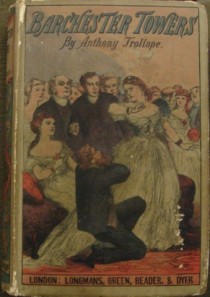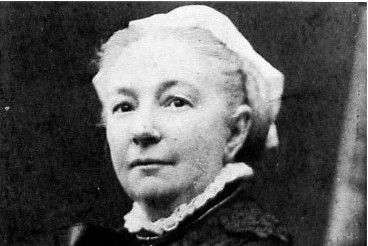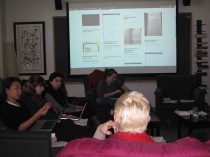Author Archives: rbuurma1
Week 4
Cathy’s paper: What happens when the narrator in question is supposedly representing the actual story of the author, not ‘fiction?’ Is the authorial intent still relevant in interpreting the work? Reading Oliphant’s autobiography, a reader is presented with numerous instances that seem to question the supposed divide between the author and the narrator or internal evidence versus external evidence.
Week 4
Cathy’s paper: What happens when the narrator in question is supposedly representing the actual story of the author, not ‘fiction?’ Is the authorial intent still relevant in interpreting the work? Reading Oliphant’s autobiography, a reader is presented with numerous instances that seem to question the supposed divide between the author and the narrator or internal evidence versus external evidence.
Week 3
Without even realizing it, we amble like Ursula around campus or in the city, surrounded by sensation (‘reality’) yet caught up in those “castles in the air” which, for Victorian novelists like Trollope and Oliphant, are at once the birthplace and reification of the realist narrative. This concern for the practical effects of realism on our everyday experience and even our identity construction still pervades much of our lives but, like Ursula, we frequently overlook it. The reading of Victorian realist novels can help re-sensitize us to this narrative mode which has become so essential to how we internally negotiate our own experience. (Alison’s Week 3 seminar paper.)
Week 3
Without even realizing it, we amble like Ursula around campus or in the city, surrounded by sensation (‘reality’) yet caught up in those “castles in the air” which, for Victorian novelists like Trollope and Oliphant, are at once the birthplace and reification of the realist narrative. This concern for the practical effects of realism on our everyday experience and even our identity construction still pervades much of our lives but, like Ursula, we frequently overlook it. The reading of Victorian realist novels can help re-sensitize us to this narrative mode which has become so essential to how we internally negotiate our own experience. (Alison’s Week 3 seminar paper.)

Week 2
“When I read Trollope, it is all I can do not to be bored. All I can do, because Trollope always seems a little bored himself.” (Miller, Chapter 4, p.145)

Jordan Stein’s “Silly Theory”
Jordan Stein’s “Silly Theory” gives us a very different version of the social experience of theory, or theory’s reception than does the Nicolas Dames piece Danielle posted – interesting to compare them.

Jordan Stein’s “Silly Theory”
Jordan Stein’s “Silly Theory” gives us a very different version of the social experience of theory, or theory’s reception than does the Nicolas Dames piece Danielle posted – interesting to compare them.
Week 6 Outline
“In this sense, we may go even further in our account of the ideological mission of the nineteenth century realistic novelists, and assert that their function is not merely to produce new mental and existential habits, but in a virtual or symbolic way to produce this whole new spatial and temporal configuration itself: what will come to be called “daily life”, the Alltag, or, in a different terminology, the “referent” – so many diverse characterizations of the new configuration of public and private spheres or space in classical or market capitalism” (Jameson’s “Realist Floor-Plan” (374) as excerpted in 374 in Michael’s Criticism Summary)
Week 6 Outline
“In this sense, we may go even further in our account of the ideological mission of the nineteenth century realistic novelists, and assert that their function is not merely to produce new mental and existential habits, but in a virtual or symbolic way to produce this whole new spatial and temporal configuration itself: what will come to be called “daily life”, the Alltag, or, in a different terminology, the “referent” – so many diverse characterizations of the new configuration of public and private spheres or space in classical or market capitalism” (Jameson’s “Realist Floor-Plan” (374) as excerpted in 374 in Michael’s Criticism Summary)
Maddie on Frankenstein in Great Expectations
In comparing Great Expectations to Frankenstein, Pip seems to imply that Magwitch is his Dr. Frankenstein. Of course, in some ways Magwitch fits that role completely. After all, as Magwitch happily proclaims many times, he is the one who makes
Maddie on Frankenstein in Great Expectations
In comparing Great Expectations to Frankenstein, Pip seems to imply that Magwitch is his Dr. Frankenstein. Of course, in some ways Magwitch fits that role completely. After all, as Magwitch happily proclaims many times, he is the one who makes
Danielle’s seminar paper on law in Great Expectations
From “The Law as ‘Portable Property’ in Great Expectations: Regardless of who—if anyone—maintains legal authority, the idea of the law haunts the city. Notably, Pip fears that he carries the “Newgate cobwebs” with him on his body (296), even after
Danielle’s seminar paper on law in Great Expectations
From “The Law as ‘Portable Property’ in Great Expectations: Regardless of who—if anyone—maintains legal authority, the idea of the law haunts the city. Notably, Pip fears that he carries the “Newgate cobwebs” with him on his body (296), even after
Cathy’s close reading of Great Expectations
Passage: It revived my utmost indignation to find that she was still pursued by this fellow, and I felt inveterate against him. I told her so, and told her that I would spend any money or take any pains to
Cathy’s close reading of Great Expectations
Passage: It revived my utmost indignation to find that she was still pursued by this fellow, and I felt inveterate against him. I told her so, and told her that I would spend any money or take any pains to

Margaret Oliphant, An Autobiography
“It pleases me at this present moment, I may confess, that I seem to have found unawares an image that quite expresses what I mean — i.e., that I wrote as I read, with much the same sort of feeling. It seems to me that this is rather an original way of putting it (to disclose the privatest thought in my mind), and this gives me an absurd little sense of pleasure.”

Margaret Oliphant, An Autobiography
“It pleases me at this present moment, I may confess, that I seem to have found unawares an image that quite expresses what I mean — i.e., that I wrote as I read, with much the same sort of feeling. It seems to me that this is rather an original way of putting it (to disclose the privatest thought in my mind), and this gives me an absurd little sense of pleasure.”
